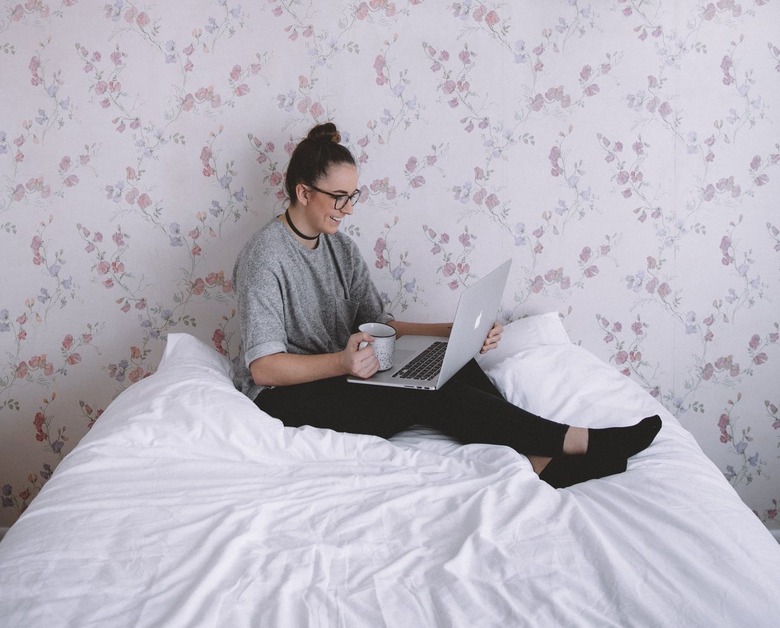How Unsanitary It Really Is To Wear 'Outside Clothes' In Bed, According To Experts
A full night of rest is crucial for your overall health, but making sure your bedroom is clean is just as important. While this includes washing the bed sheets, decluttering, and dusting, for some people, it also involves keeping "outside clothes" away from the bed.
Depending on who you ask, the thought of clothes that have been out of the home (and worn all day long, no less) touching a space used for sleep can be pretty gross. Some may even go as far as showering before bedtime in order to limit the amount of grime as much as possible on their sheets.
Disregarding personal preference, how unsanitary is it really to wear your "outside clothes" in bed? Read on to learn what medical professionals have to say about the routine.
The Link Between Your Bedding and Germs
The Link Between Your Bedding and Germs
Before exploring the ick factor of outside clothes touching the bed, it helps to understand how your bedding contributes to health risks — if at all.
In general, your bedding (blankets, sheets, pillowcases) won't cause an infectious disease as long as they're regularly washed, Manan Shah, M.D. — chief medical officer at allergy care resource Wyndly and an ear, nose, and throat surgeon — tells Hunker. That's because bedding is unlikely to hold harmful pathogens in amounts that would actually cause disease. (The exception, however, is a bed that's being used by someone who already has an infectious condition.)
But bedding can cause allergic reactions by harboring certain substances. This includes allergens like dust mites, pet dander, and pollen, according to allergist immunologist Dr. Karen Kaufman.
Is It Gross to Wear Outside Clothes in Bed?
Is It Gross to Wear Outside Clothes in Bed?
Here's the deal: "As long as the clothes are not visibly dirty, sweaty, or smelly, there is little health risk [when wearing them in bed]," Shah explains. This is especially true if you only wear your outside clothes in bed every once in a while, he adds. Kaufman echoes this sentiment, telling Hunker, "Overall, sleeping in outside clothes does not pose a major health risk."
Of course, there are some exceptions, as the definition of "outside clothes" can vary widely. For example, if you're exposed to toxic chemicals in a workplace, you'll definitely want to avoid lying down in the clothes you wore to work. Similarly, if you've been somewhere with a high prevalence of contagious pathogens (think: healthcare settings), it's a good idea to change before heading to bed, Kaufman states. "Our immune systems should help us with regular exposures to bacteria, fungi, and viruses — but for excessive exposures, care should be taken to change clothing [right after exposure]," she notes.
Another exception is if your outside clothes are clearly dirty, sweaty, or soiled, explains Shah. In this case, it is pretty gross to wear such clothes in bed, as it will continue exposing your body to a dirty and germy environment. Not to mention, "you'll just end up having to wash the sheets," adds Shah. This is even more important to consider if you have an open wound or compromised immune system, as soiled bedding may increase the risk of infection.
"The most important thing to remember is that a majority of germs that make us sick are those [that are transmitted] through direct contact," says Kaufman. That's why secondary exposure — like your bedding — is less likely to cause illness, and why washing your hands is the best way to reduce infectious exposure.
Obviously, if the idea of wearing outside clothes in bed still gives you the shivers, there's no reason to not change before bed. Personally, we'll be doing just that!
Avoid the Habit If You Have Seasonal Allergies
Avoid the Habit If You Have Seasonal Allergies
Okay, so wearing outside clothes in bed presents a low risk for infectious disease. But what about seasonal allergies? That's a different story, according to the pros. "Pollen granules and outdoor mold spores can adhere to our clothing and hair [when we spend time] outdoors," explains Kaufman. "Wearing these clothes to bed could introduce these allergy triggers into your bedding." This can pave the way for unpleasant allergic reactions, says Shah.
If you're allergic to pollen, you'll definitely want to change (and rinse off) before hitting the hay.
